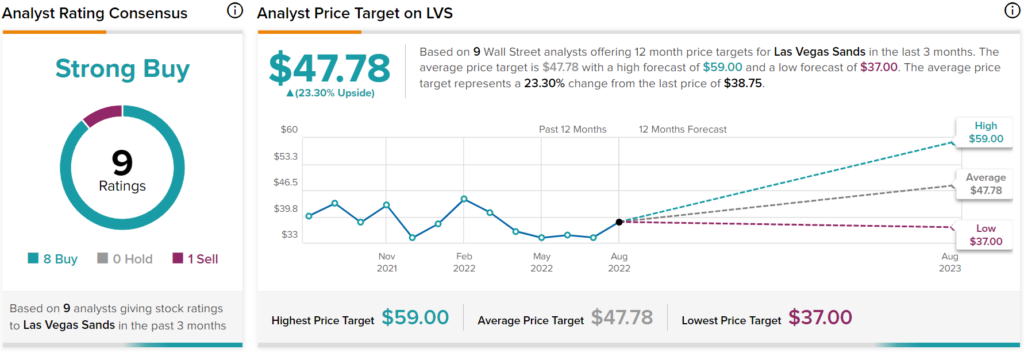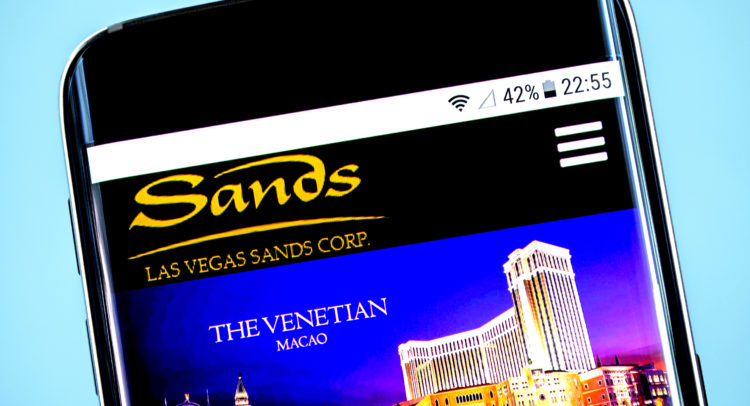Casino and resort giant Las Vegas Sands (LVS) appears to be in a pickle, being completely levered to its operations in Macau, a special administrative region of China. Unfortunately for the company, Macau is following China’s leadership when it comes to draconian COVID-19 mandates, thus devastating sales. While the situation doesn’t look pleasant now, patient investors may be rewarded for their commitment. I am neutral on LVS stock.
In March of 2021, Las Vegas Sands generated headlines when it announced that it would sell its geographical namesake properties for $6.25 billion. Vici Properties (VICI) paid $4 billion to buy out the real estate, while Apollo Global Management (APO) bought the operations for $2.25 billion.
Essentially, the sale represented a shot across the bow, with Las Vegas Sands doubling down on its investments in Asia. Prior to the COVID-19 crisis, the company’s eastern properties accounted for approximately 90% of its revenue.
At the moment, though, management may be regretting the decision. While Macau has an unorthodox relationship with Beijing, the gambling mecca of Asia has generally marched in lockstep with the mainland’s strict COVID-19 policies. Disappointing legions of gamblers, Macau-based casino sales tumbled, dropping from one low to another.
Curiously, though, LVS stock has held up relatively well. Shares are up about 3% on a year-to-date basis, and performing considerably better than Wynn Resorts (WYNN), which is down almost 20% during the same period. As well, MGM Resorts (MGM) is posting similar levels of underperformance to WYNN, shedding 21% YTD.
While the broader casino industry is fraught with risk, LVS stock is likely well-positioned for the long run.
Las Vegas Sands Stock Analysis
On TipRanks, LVS has a 7 out of 10 Smart Score rating. This indicates strong potential for the stock to outperform the broader market.

LVS Stock and the Culture Effect
In the movie Casino, Academy Award winner Robert De Niro played sports handicapper and Mafia associate Sam “Ace” Rothstein. Near the very end of the film, Rothstein provided a voiceover, bemoaning that Las Vegas would “never be the same.” A cultural shift occurred, forever changing the landscape of Sin City.
While Vegas will likely always be considered a gambling haven – along with providing a safe space for other vices – Rothstein complained that the big corporations essentially took over. Now, instead of big wigs coming over to play games of chance, the desert town is filled with pensioners and families with young children.
Put another way, Americans enjoy the experience of the casinos rather than the casinos themselves.
As I mentioned in my write-up for WYNN stock, in the first quarter of 2019, Wynn’s “casino revenue accounted for only about 28% of total revenue at Sin City. Further, in Q1 2022, this allocation was little changed at a bit over 28%. Indeed, for the latest quarter, Food and Beverage, along with Rooms, were the top revenue generators, confirming the De Niro character’s point.”
What makes this dynamic problematic for Wynn’s Vegas properties is that while casino-related sales can generate possibly tens of thousands of dollars per every hour, the other operating components represent one-off expenditures. “For instance, a lobster can only be eaten once, while a room can only be rented to a single guest or group at a time.”
On the flipside, in Wynn’s Macau properties, the casino-related operations are king, representing the bulk of total revenue. Basically, it comes down to a cultural difference between the gamblers. People go to Macau to wager on games of chance, not necessarily to be entertained.
Las Vegas Sands is All about the Gamblers
From a long-term time horizon, LVS stock is tied to the better-positioned business model. Back in Q2 2019, Las Vegas Sands’ casino-related sales from Macau properties combined for $1.7 billion, representing over 79% of total net revenue in its Asia segment. Fast forward to Q2 2022, casino sales at the Macau properties rang up $709 million. Although lower, the main takeaway is that casinos in Macau still represent the lion’s share of total net revenue (in this case, nearly 68%).
Admittedly, Las Vegas Sands’ decision to sell its Vegas properties doesn’t seem like a smart move today. Undoubtedly, the underlying business of LVS stock is hurting. With Beijing running a tight ship in the COVID-19 department, any further flareups from the SARS-CoV-2 virus could result in yet more problems for Las Vegas Sands. Still, when it comes to gambling, the future is in Asia.
Another factor to consider is that if the pent-up demand phenomenon that bolstered the retail and travel sectors in the U.S. plays out in China (and Asia more broadly), LVS stock could be a massive winner. It’s speculation, of course, but denial of opportunities only makes the hunger grow stronger.
Is LVS Stock a Buy Right Now?
Turning to Wall Street, LVS stock has a Strong Buy consensus rating based on eight Buys and one Sell assigned in the past three months. The average LVS price target is $47.78, implying 23.3% upside potential.

LVS Stock is an Investment for the ‘Visionary’
While LVS stock seems stuck in a rut because of its exclusive exposure to the Asian gambling market, once the COVID-19 crisis is fully placed in the rearview mirror, shares could eventually blossom. It does require significant patience and a commitment to the vision, so only hardened speculators should apply.

